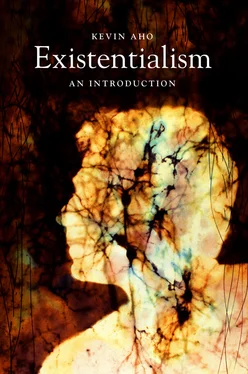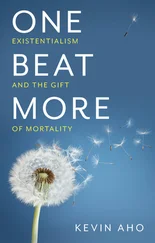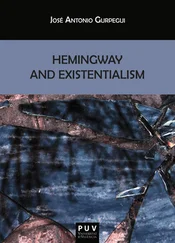Kevin Aho - Existentialism - An Introduction
Здесь есть возможность читать онлайн «Kevin Aho - Existentialism - An Introduction» весь текст электронной книги совершенно бесплатно (целиком полную версию без сокращений). В некоторых случаях можно слушать аудио, скачать через торрент в формате fb2 и присутствует краткое содержание. Год выпуска: 2013, ISBN: 2013, Издательство: Polity, Жанр: Философия, на английском языке. Описание произведения, (предисловие) а так же отзывы посетителей доступны на портале библиотеки ЛибКат.
- Название:Existentialism: An Introduction
- Автор:
- Издательство:Polity
- Жанр:
- Год:2013
- ISBN:978-0745651422
- Рейтинг книги:3 / 5. Голосов: 1
-
Избранное:Добавить в избранное
- Отзывы:
-
Ваша оценка:
- 60
- 1
- 2
- 3
- 4
- 5
Existentialism: An Introduction: краткое содержание, описание и аннотация
Предлагаем к чтению аннотацию, описание, краткое содержание или предисловие (зависит от того, что написал сам автор книги «Existentialism: An Introduction»). Если вы не нашли необходимую информацию о книге — напишите в комментариях, мы постараемся отыскать её.
Existentialism: An Introduction
Existentialism: An Introduction — читать онлайн бесплатно полную книгу (весь текст) целиком
Ниже представлен текст книги, разбитый по страницам. Система сохранения места последней прочитанной страницы, позволяет с удобством читать онлайн бесплатно книгу «Existentialism: An Introduction», без необходимости каждый раз заново искать на чём Вы остановились. Поставьте закладку, и сможете в любой момент перейти на страницу, на которой закончили чтение.
Интервал:
Закладка:
Finally, insofar as we are caught up in the world, we embody a pre-reflective understanding that enables us to handle things and move through the world in a smooth and seamless way. This means that in the flow of everyday life, our actions are usually unaccompanied by mental intentions. Any reflective awareness of our perceptions and actions always presupposes a non-reflective, non-self-referential way of being-in-the-world (Dreyfus 1991, 54–59). Existentialists are not denying that deliberate, self-referential actions take place; they are simply making it clear that every day and for the most part they do not. In our ordinary activities we are not thinking about what we are doing because we already embody an understanding of the relational context that we are involved in.
Here, it is important to note the impact existentialist accounts of being-in-the-world have had on recent research in cognitive science. Philosophers have long assumed that human behavior must somehow be represented or mirrored in the mind or brain, but existentialists have shown that our everyday practices are usually performed without mental representation. Beginning with the groundbreaking work of Hubert Dreyfus (1972) and continuing in the current research of philosophers such as Sean Gallagher (2005) and Michael Wheeler (2005), existentialism is experiencing a renaissance in contemporary philosophy by showing how traditional accounts of human behavior are unable to explain how we can be skillfully engaged in the world in a way that we are not thematically conscious of. The core insight of being-in-the-world is that much of our ordinary activity can be described and understood without appealing to a self-referential mind or consciousness. Indeed, it reveals that it is largely through these embodied, pre-reflective acts that our projects, roles, identities, and equipment make sense to us. If this is the case, then the standard account of the human being as a self-enclosed mind set over and against objects is mistaken because we are, first and foremost, a situated way of being that is already engaged in contexts of meaning, and it is this fluid engagement that allows things to matter to us in the ways that they do. What this shows is that existentialism is not only alive and well as a significant force in current debates in cognitive science and philosophy of mind, but, as an intellectual movement, it was also well ahead of its time.
Dreyfus, H. (1991). Being-in-the-world: A commentary on Heidegger's Being and Time, division I . Cambridge, MA: MIT Press.
Guignon, C. B. (1983). Heidegger and the problem of knowledge . Indianapolis: Hackett.
Weate, J. (2001). Fanon, Merleau-Ponty, and the difference of phenomenology. In R. Bernasconi (ed.), Race (pp. 169–183). Oxford: Blackwell.
Wrathall, M. (2009). Existential phenomenology. In H. Dreyfus and M. Wrathall (eds.), A companion to phenomenology and existentialism (pp. 31–41). Oxford: Blackwell.
4: Self and Others
The problem of substance
Beginning with the Greeks, philosophers have largely adopted what can be called ‘substance ontology,’ the view that beings — rocks, trees, animals, and humans — must be understood in terms of substance of some sort, where ‘substance’ refers to the enduring properties or essence that ‘stands under’ (i.e., sub-stand) and remains the same through any change (Frede 2006). Plato, for example, conceived of the essence of things in terms of immutable forms or ideas ( eidos ). Descartes regarded things as either one of two substances, immaterial minds ( res cogitans ) or material bodies ( res extensa ). And today, with the dominance of naturalism, we tend to see things as causally determined physical substances. As we saw in chapter 2, viewing human beings as entities with a pre-given ‘essence’ is problematic because it overlooks the fact that we make ourselves who we are on the basis of our meaning-giving choices and actions, and this activity of self-making underlies any account of our physical or psychical makeup. This is why existentialists are cautious about traditional designations of the human being such as ‘living creature,’ ‘rational animal,’ ‘ ego cogito ,’ or ‘organism’ and largely avoid discussing our zoological, anatomical, or spiritual makeup. As Heidegger says, “What is to be determined is not an outward appearance of this entity but … the how of its being and the characters of this how ” (1985, 154). By focusing on ‘ how we are’ rather than ‘ what we are,’ existentialists develop a conception of selfhood that dissolves the substance-centered view of the self.
First, existentialists contend that humans exist in a way that is fundamentally different from other beings in the natural world. We cannot be interpreted as things or substances that are objectively present, because we exist , that is, we are always choosing and acting as our lives unfold. This means there is no pre-given nature that determines who we are. We are self-creating beings that become who we are on the basis of our life decisions. There is, then, no complete or definitive account of who we are. We are always a ‘not yet’ as we press forward, fashioning and re-fashioning our identities — as a loving husband, a loyal friend, or a responsible citizen — and there is no essential ground or foundation that underlies and secures the identity that we create. What distinguishes us from all other entities, as Ortega y Gasset writes, is that our “being consists not in what it is already, but in what it is not yet , a being that consists in not-yet-being . Everything else in the world is what it is. … Man is the entity that makes itself. … He has to determine what he is going to be” (1941, 112, 201–202, my emphasis).
Second, substance ontology tends to regard the self as an encapsulated mind or will that is separate and distinct from objects. As we saw in chapter 3, existentialists argue that this view betrays the fact that, in our everyday involvements, we are already bound up in meaningful situations. Given this account, the standard view of the self as a detached cogito is a mistake that uncritically assumes the existence of an independent mental sphere that is somehow detached from the outer world. For the existentialists, there is no ‘inner/outer’ distinction. “Truth does not ‘inhabit’ only the ‘inner man,’ ” says Merleau-Ponty, “or more accurately, there is no inner man; man is in the world, and only in the world does he know himself” (1962, xi).
Finally, the existentialist conception of the self dissolves the Cartesian idea that the human being is a composite of two substances, a mind (or soul) and a body, where the mind is viewed as the ‘subject of experience,’ the sovereign center of beliefs, thoughts, and perceptions, and the body is viewed as a physical organism governed by the causal laws of the natural world. On this view, one's own body is seen as something that we are only contingently connected to, a material shell that is just one more object that the mind can examine and represent from a detached standpoint. In terms of human agency, this material shell is regarded as a tool or instrument that the mind manipulates in order to realize desired ends. It is by means of forming a particular mental representation, for instance, that I cause my legs to move so I can walk out of my office and interact with colleagues at the end of the hall. This view suggests that we encounter our body (and other bodies) only indirectly, through the mediation of the mind.
Again, as we saw earlier, existentialists undercut this dualism by arguing that when we are absorbed in the acts and practices of everyday life, our body is not encountered objectively as a physical machine. As I drive to work, drink my coffee, type on the computer, or chat with friends, my physical body disappears and takes on a kind of mindless transparency. “It flows together,” says Heidegger, “[with everything else] in the situation” (2002, 174). Here ‘body’ refers to my pre-reflective ability to move through my surroundings, to be absorbed in the flow of a particular situation, and to be affectively attuned to others. Indeed, for the existentialists, the distinction between an immaterial mind and a physical body is derived from and made possible by our situated and embodied way of being. As Merleau-Ponty explains, “Our body provides us with a practical knowledge, which has to be recognized as original and perhaps primary. My body has its world or understands its world without having to make any ‘symbolic’ or ‘objectifying’ function” (1962, 140–141). This notion of embodiment is one of the definitive contributions of existentialism.
Читать дальшеИнтервал:
Закладка:
Похожие книги на «Existentialism: An Introduction»
Представляем Вашему вниманию похожие книги на «Existentialism: An Introduction» списком для выбора. Мы отобрали схожую по названию и смыслу литературу в надежде предоставить читателям больше вариантов отыскать новые, интересные, ещё непрочитанные произведения.
Обсуждение, отзывы о книге «Existentialism: An Introduction» и просто собственные мнения читателей. Оставьте ваши комментарии, напишите, что Вы думаете о произведении, его смысле или главных героях. Укажите что конкретно понравилось, а что нет, и почему Вы так считаете.












